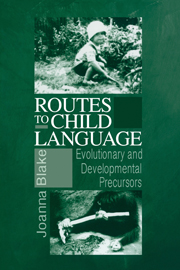Book contents
- Frontmatter
- Contents
- Preface
- 1 Prelinguistic Vocalizations
- 2 Sound–Meaning Correspondences
- 3 Communicative Gestures
- 4 Symbolic Gestures and Symbolic Play
- 5 Tool Use and Object Concept
- 6 Representation in Human Infants
- 7 Memory in Nonhuman Primates and Young Children
- 8 Origins of Language
- 9 Recapitulation
- References
- Index
9 - Recapitulation
Published online by Cambridge University Press: 12 January 2010
- Frontmatter
- Contents
- Preface
- 1 Prelinguistic Vocalizations
- 2 Sound–Meaning Correspondences
- 3 Communicative Gestures
- 4 Symbolic Gestures and Symbolic Play
- 5 Tool Use and Object Concept
- 6 Representation in Human Infants
- 7 Memory in Nonhuman Primates and Young Children
- 8 Origins of Language
- 9 Recapitulation
- References
- Index
Summary
In this book, I have compared directly the evidence available on nonhuman primates and human infants/children with regard to several precursors of language: prelinguistic vocalizations, sound–meaning correspondences, communicative gestures, symbolic gestures and symbolic play, tool use and object permanence, representation, and memory. I think that this comparison has made it clear that the great apes differ very little from human infants in many communicative gestures, in tool use and object concept, in delayed imitation, and in the mental representation implied by their advanced abilities in these domains. Nonhuman primates can also be said to exhibit the necessary frequency modulation for prosody, as well as turn taking in dialogues. Where human infants depart from nonhuman primates is in their vocalization ability after age 4 months and particularly after the onset of CB containing true consonants in babbling is important not only for early word acquisition but also for later sentence production. Unlike nonhuman primates in the wild, human infants also show object sharing gestures that are related to early vocabulary acquisition and information-sharing gestures that are related to later word comprehension. A decrease in primitive gestures, such as protest and reach-request, also has longterm implications for later communicative competence and productive language complexity.
Human infants also exceed apes in their ability to map sounds onto many different situations, and they exhibit invented symbolic gestures and complex symbolic play not found in apes.
Information
- Type
- Chapter
- Information
- Routes to Child LanguageEvolutionary and Developmental Precursors, pp. 228 - 232Publisher: Cambridge University PressPrint publication year: 2000
